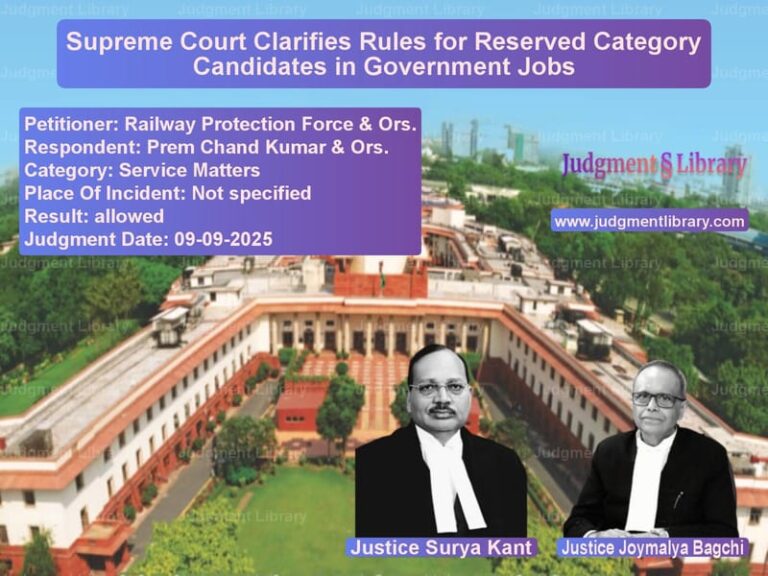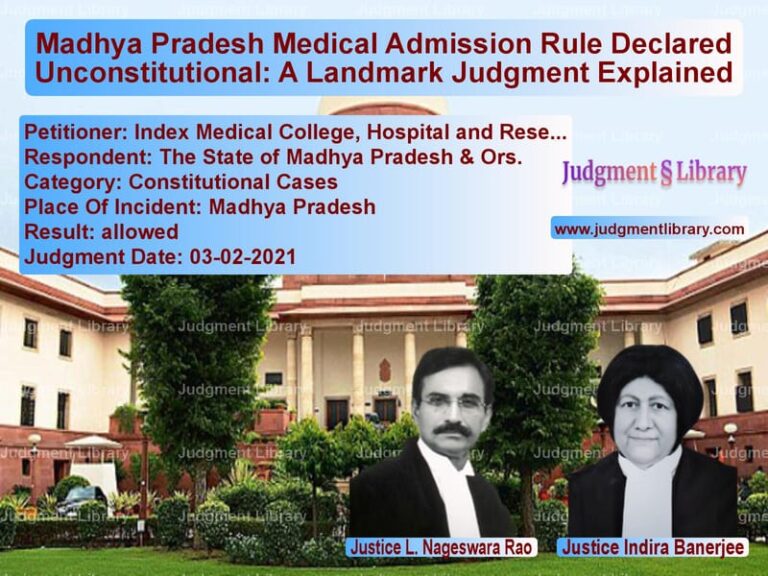Supreme Court Criticizes Repeated Adjournments in Civil Litigation
The case of Ishwarlal Mali Rathod vs. Gopal & Ors. before the Supreme Court of India highlights the issue of repeated adjournments granted in civil cases, leading to delays in justice delivery. The case involved a landlord-tenant dispute where the defendant repeatedly sought adjournments, ultimately leading to the closure of the right to cross-examine the plaintiff’s witness.
Background of the Case
The respondents (original plaintiffs) filed a suit for eviction, arrears of rent, and mesne profit against the petitioner (defendant) in 2013. Over the years, the petitioner sought multiple adjournments, delaying the trial significantly.
The trial court granted several opportunities for the defendant to cross-examine the plaintiff’s witness. However, despite these opportunities:
- Between 2015 and 2019, the defendant sought adjournments at least ten times.
- The court imposed a cost of Rs. 5,000 and granted a final opportunity on 14.10.2019.
- The court explicitly stated that if the defendant failed to cross-examine the witness, their right would be closed.
- Despite this, the defendant again failed to cross-examine the witness, leading to the closure of their right on 05.11.2019.
Legal Proceedings
1. Trial Court’s Order (21.12.2020)
After granting multiple adjournments and imposing costs, the trial court closed the defendant’s right to cross-examine the witness.
2. High Court’s Order (17.02.2021)
The defendant filed a miscellaneous petition before the High Court of Madhya Pradesh, Indore Bench, challenging the trial court’s order. However, the High Court dismissed the petition, upholding the trial court’s decision.
3. Appeal Before the Supreme Court
The defendant then approached the Supreme Court, challenging the High Court’s ruling.
Supreme Court’s Key Observations
The Supreme Court strongly criticized the misuse of adjournments and the conduct of the defendant. The Court observed:
1. Misuse of Adjournments
“Present is a classic example of misuse of adjournments granted by the court.”
The Court noted that despite multiple opportunities and costs imposed, the defendant continuously delayed the proceedings.
2. Adjournments Delay Justice
“Repeated adjournments on one or the other pretext and adopting dilatory tactics is an insult to justice and the concept of speedy disposal of cases.”
The Court emphasized that the justice system suffers due to delays, and litigants must not be allowed to misuse legal procedures.
3. Responsibility of Courts to Prevent Delays
The Court criticized both the trial court and the High Court for repeatedly granting adjournments, stating:
“Unfortunately, the trial court and even the High Court continued to grant adjournment after adjournment, contributing to the delay in the disposal of the suit.”
4. Need for Timely Justice
The Court cited past precedents emphasizing the importance of timely justice:
- In Shiv Cotex vs. Tirgun Auto Plast (P) Ltd. (2011) 9 SCC 678, the Court held that courts must ensure effective progress on every hearing date.
- In Babu Singh vs. State of U.P. (1978) 1 SCC 579, Justice Krishna Iyer observed that delays in the justice system undermine the right to a fair trial.
- In Noor Mohammed vs. Jethanand (2013) 5 SCC 202, the Court condemned repeated adjournments, stating that procrastination cripples the justice system.
5. Advocates’ Role in Delays
The Court also criticized the role of lawyers in delaying proceedings:
“Law and professional ethics do not permit such practices. It is the duty of lawyers to cooperate with the courts and ensure effective case management.”
Final Judgment
The Supreme Court dismissed the special leave petitions, stating:
- The defendant misused court procedures and showed no intention of participating in a fair trial.
- The trial court was justified in closing the right to cross-examine.
- Courts must discourage unnecessary adjournments to ensure speedy justice.
Implications of the Judgment
This ruling has far-reaching consequences for civil litigation in India:
1. Strengthening Judicial Discipline
The judgment reinforces that courts must not grant adjournments casually. It highlights the responsibility of judicial officers to prevent delays.
2. Holding Litigants Accountable
Litigants who misuse adjournments will now face stricter consequences. The ruling sends a clear message that delaying tactics will not be tolerated.
3. Ensuring Speedy Disposal of Cases
The decision upholds the principle of timely justice, which is essential for maintaining public confidence in the judiciary.
4. Impact on Eviction Cases
The Court specifically mentioned that in eviction cases, delays harm landlords, especially when the eviction is sought for bona fide personal needs.
Conclusion
The Supreme Court’s ruling in Ishwarlal Mali Rathod vs. Gopal & Ors. is a landmark judgment reinforcing the importance of timely justice. The Court’s strong remarks against the misuse of adjournments serve as a warning to litigants and legal practitioners who attempt to delay proceedings. This judgment ensures that courts remain committed to efficient and fair adjudication of disputes.
Petitioner Name: Ishwarlal Mali Rathod.Respondent Name: Gopal & Ors..Judgment By: Justice M. R. Shah, Justice A. S. Bopanna.Place Of Incident: Indore, Madhya Pradesh.Judgment Date: 20-09-2021.
Don’t miss out on the full details! Download the complete judgment in PDF format below and gain valuable insights instantly!
Download Judgment: ishwarlal-mali-ratho-vs-gopal-&-ors.-supreme-court-of-india-judgment-dated-20-09-2021.pdf
Directly Download Judgment: Directly download this Judgment
See all petitions in Property Disputes
See all petitions in Landlord-Tenant Disputes
See all petitions in Damages and Compensation
See all petitions in Contract Disputes
See all petitions in Judgment by Mukeshkumar Rasikbhai Shah
See all petitions in Judgment by A. S. Bopanna
See all petitions in dismissed
See all petitions in supreme court of India judgments September 2021
See all petitions in 2021 judgments
See all posts in Civil Cases Category
See all allowed petitions in Civil Cases Category
See all Dismissed petitions in Civil Cases Category
See all partially allowed petitions in Civil Cases Category







